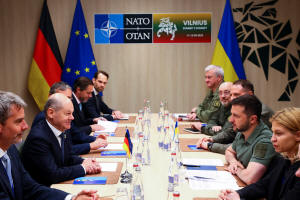G7 to offer Ukraine security 'framework', Zelenskiy asks NATO allies for
more arms
 Send a link to a friend
Send a link to a friend
 [July 12, 2023]
By Andrew Gray, John Irish, Steve Holland and Sabine
Siebold [July 12, 2023]
By Andrew Gray, John Irish, Steve Holland and Sabine
Siebold
VILNIUS (Reuters) - Britain, the United States and global allies were
due to unveil new security assurances for Ukraine on Wednesday, after a
NATO summit the day before said Kyiv would be welcome in the alliance
but stopped short of naming a date or exact conditions.
President Volodymyr Zelenskiy denounced the outcome as "absurd", saying
Ukraine deserved a clear timetable while it was fighting against a
Russian invasion launched in February 2022.
Instead, a declaration by the G7 world's most industrialised countries
"will set out how allies will support Ukraine over the coming years to
end the war and deter and respond to any future attack", said a British
government statement.
In practice, this would come as bilateral agreements with Kyiv on
long-term military and financial aid to keep Ukraine's army and economy
running. A White House official said the United States would start such
talks with Kyiv "soon".

"We expect more non-G7 allies and partners will want to join afterwards
and do their own bilateral versions of this," said the official. The G7
is made up of the United States, Germany, Japan, France, Canada, Italy
and Britain.
NATO, an alliance built around mutual security guarantees - the concept
that an attack on one is an attack on all - has carefully avoided
extending any firm military commitments to Ukraine, worried that would
risk taking it closer to a full-on war with Russia.
Ukraine is deeply suspicious of any less-binding security "assurances",
given that Russia's invasion already trampled the so-called Budapest
Memorandum under which international powers committed to keeping the
country safe in exchange for Kyiv giving up its Soviet-era nuclear arms.
MORE ARMS
On Wednesday, Zelenskiy was holding bilateral meetings with the United
States, Canada, Germany, Britain, Japan and the Netherlands on the
sidelines of the second day of the NATO summit in Vilnius to secure more
arms for his counteroffensive.

[to top of second column]
|

Ukraine's President Volodymyr Zelenskiy
and German Chancellor Olaf Scholz meet during a NATO leaders summit
in Vilnius, Lithuania July 12, 2023. REUTERS/Yves Herman

"More weapons for our warriors, more protection of life for the
whole of Ukraine! We will bring new important defence tools to
Ukraine," he said on Twitter.
The first sitting of a new NATO-Ukraine Council was also due on
Wednesday, a new format designed to tighten cooperation between Kyiv
and the 31-nation alliance.
NATO was set up in 1949 to defend allies against any attack from the
Soviet Union. After the Cold War ended and some in the West hoped to
improve ties with Moscow, a similar NATO-Russia Council was set up
in 2002.
NATO stopped that engagement after Russia annexed the Black Sea
peninsula of Crimea from Kyiv in 2014 and then went on to back
separatist rebels fighting government troops in eastern Ukraine.
Russia's full-scale invasion in 2022 brought war back to Europe's
doorstep, reviving Cold War-era animosities.
NATO says Ukraine would not be allowed in while at war with Russia,
with Washington and Berlin warning against any moves that could put
the alliance in a direct conflict with Moscow.
Backers of Ukraine's swift NATO accession in eastern Europe and
elsewhere, on the other hand, have bristled at what they saw as a
disappointing outcome of the first day of the summit.
Russia, which says NATO's eastward expansion is an existential
threat to its own security, swiftly lashed out.

Dmitry Medvedev, the deputy secretary of Russia's powerful Security
Council chaired by President Vladimir Putin, said increasing
military assistance to Ukraine by NATO was bringing closer a World
War Three.
(Reporting by John Irish, Steve Holland, Justyna Pawlak, Sabine
Siebold, Andrew Gray, Max Hunder, Writing by Gabriela Baczynska;
Editing by Alex Richardson)
[© 2023 Thomson Reuters. All rights
reserved.]This material may not be published,
broadcast, rewritten or redistributed.
Thompson Reuters is solely responsible for this content. |